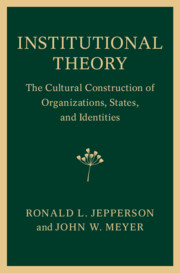Book contents
- Institutional Theory
- Institutional Theory
- Copyright page
- Contents
- Figures
- Preface
- Credits
- Part I Introduction
- Part II Institutional Theory: Its Role in Modern Social Analysis
- Part III The Institutional Level of Analysis
- 6 Multiple Levels of Analysis and the Limitations of Methodological Individualisms (2011)
- 7 The Limiting Effects of Analytical Individualism:
- 8 Reflections on Part III:
- Part IV Institutions of Modernity and Postmodernity: The Construction of Actors
- Part V Conclusion
- Index
- References
8 - Reflections on Part III:
Levels of Analysis
from Part III - The Institutional Level of Analysis
Published online by Cambridge University Press: 22 March 2021
- Institutional Theory
- Institutional Theory
- Copyright page
- Contents
- Figures
- Preface
- Credits
- Part I Introduction
- Part II Institutional Theory: Its Role in Modern Social Analysis
- Part III The Institutional Level of Analysis
- 6 Multiple Levels of Analysis and the Limitations of Methodological Individualisms (2011)
- 7 The Limiting Effects of Analytical Individualism:
- 8 Reflections on Part III:
- Part IV Institutions of Modernity and Postmodernity: The Construction of Actors
- Part V Conclusion
- Index
- References
Summary
Much social science still fails to employ a now standard philosophical and scientific conceptualization of levels of analysis.In so doing, it still largely avoids the multilevel reasoning appropriate for social science, instead maintaining dogmatic attachments to one or another level of analysis, especially an individual-level one.
Keywords
- Type
- Chapter
- Information
- Institutional TheoryThe Cultural Construction of Organizations, States, and Identities, pp. 196 - 206Publisher: Cambridge University PressPrint publication year: 2021

